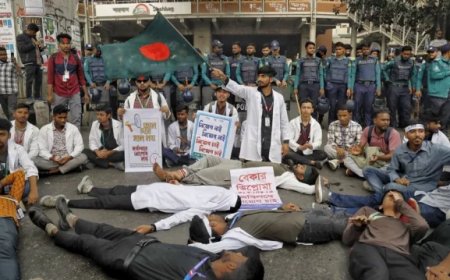A change in political power is essential to eliminate corruption and inequality
A change in political power is essential to eliminate corruption and inequality

For the past 15 years, Bangladesh has operated under a "Development, not Democracy" policy, with Prime Minister Sheikh Hasina focusing on large-scale projects that have often resulted in massive corruption. A recent white paper by Professor Debapriya Bhattacharya reveals that around $16 billion has been illicitly transferred abroad every year during this time.
In total, approximately Tk28 trillion has been siphoned off, suggesting that Sheikh Hasina and her party, the Awami League, have governed with the intent of exploiting the nation’s resources. These domestic plunderers, treating the country as expendable, have funneled their illicit wealth to destinations like Canada and Singapore. Sheikh Hasina herself has admitted that her driver owns assets worth 4 billion taka.
The student protests in July and August were driven by opposition to the corrupt practices of a powerful mafia-like syndicate. The manipulation of the quota system to place Awami League loyalists in government roles further facilitated unchecked corruption. Public frustration has also been exacerbated by rising prices, enforced disappearances, extrajudicial killings, and state repression.
As students began protesting against the syndicate, the wider public joined in solidarity. The formation of the Anti-Discrimination Student Movement platform garnered broad support, expanding the protest from a demand for quota reform into a larger anti-fascist movement.
In light of this, Bangladesh must chart a new course that eliminates corruption and exploitation from its economic system.
To create a democratic state, it is crucial to ensure social security, free education, and healthcare for citizens. Fundamental rights must be constitutionally guaranteed, and the private sector should be free from state interference, promoting healthy competition.
Tax policies need revision, and measures must be put in place to prevent waste and embezzlement in government projects. These reforms will help combat corruption and inequality, guiding the economy toward a more sustainable path.
Efforts should also focus on repatriating the funds illicitly moved abroad in the past 15 years. Strengthening measures to prevent capital flight will further enhance the economy.
Under Sheikh Hasina's rule, the banking sector has been weakened due to power abuse. To avoid further abuses, strong regulations must be implemented in the banking and insurance sectors, with necessary reforms to the laws governing banking companies, securities, and money laundering.
Completing these reforms will limit undue government interference in vital economic structures, allowing the central bank to operate independently.
A significant portion of the population works in the informal economy, including street vendors and small to medium-sized entrepreneurs, who play an essential role in the national economy. Without state support, they have secured their livelihoods independently but are often exploited by political parties and the administration.
Despite their contributions, there is no official policy or support for this sector. Recognizing and incentivizing these entrepreneurs can help counter economic monopolies.
The information technology and manpower export sectors offer great potential. By providing training to young people, substantial job opportunities can be created, leading to significant foreign exchange earnings.
The private sector employs a large number of people, but job security and fair wages remain a concern. The government should develop comprehensive plans to ensure that public employment is not seen as the only viable option.
While exploitation and inequality are inherent in capitalist systems, careful policies and planning can help reduce disparities and provide equal opportunities for all citizens.
In Bangladesh, the political power structure has fostered inequality. By restructuring political dynamics, it is possible to reduce disparities and establish a welfare state within the existing capitalist framework.
This article was published in celebration of the 15th founding anniversary of the popular Bengali daily Kaler Kantho. The author is the Joint Convener of the Jatiya Nagorik Committee.
What's Your Reaction?





















































































